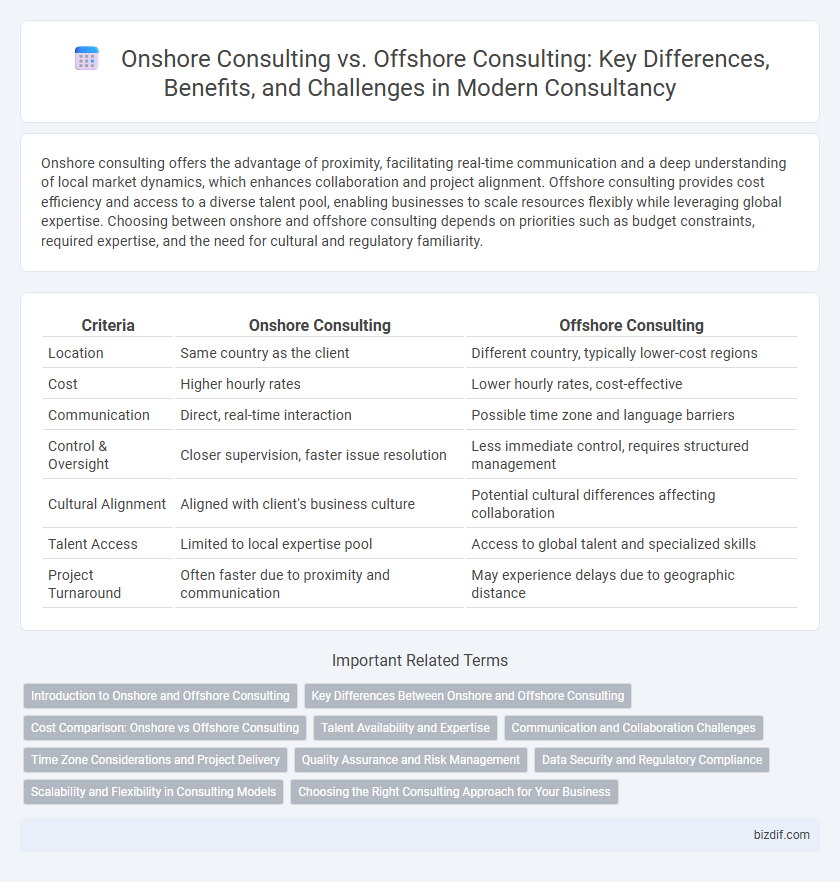Onshore consulting offers the advantage of proximity, facilitating real-time communication and a deep understanding of local market dynamics, which enhances collaboration and project alignment. Offshore consulting provides cost efficiency and access to a diverse talent pool, enabling businesses to scale resources flexibly while leveraging global expertise. Choosing between onshore and offshore consulting depends on priorities such as budget constraints, required expertise, and the need for cultural and regulatory familiarity.
Table of Comparison
| Criteria | Onshore Consulting | Offshore Consulting |
|---|---|---|
| Location | Same country as the client | Different country, typically lower-cost regions |
| Cost | Higher hourly rates | Lower hourly rates, cost-effective |
| Communication | Direct, real-time interaction | Possible time zone and language barriers |
| Control & Oversight | Closer supervision, faster issue resolution | Less immediate control, requires structured management |
| Cultural Alignment | Aligned with client's business culture | Potential cultural differences affecting collaboration |
| Talent Access | Limited to local expertise pool | Access to global talent and specialized skills |
| Project Turnaround | Often faster due to proximity and communication | May experience delays due to geographic distance |
Introduction to Onshore and Offshore Consulting
Onshore consulting involves hiring consultants located within the same country as the client, ensuring proximity, cultural alignment, and real-time communication to address business challenges efficiently. Offshore consulting refers to outsourcing consulting services to firms or professionals based in different countries, often offering cost advantages and access to specialized expertise across global markets. Both onshore and offshore consulting models enable organizations to leverage tailored solutions while balancing factors such as cost, collaboration, and market knowledge.
Key Differences Between Onshore and Offshore Consulting
Onshore consulting involves service providers located within the client's country, offering direct communication, cultural alignment, and easier compliance with local regulations. Offshore consulting typically provides cost advantages through labor arbitrage by leveraging consultants in distant countries, but may face challenges such as time zone differences and potential communication barriers. Key differences include proximity, cost structure, cultural compatibility, and project management dynamics.
Cost Comparison: Onshore vs Offshore Consulting
Onshore consulting typically involves higher hourly rates due to increased labor costs and local market demands, while offshore consulting often offers significant cost savings driven by lower wages and operating expenses in developing countries. However, offshore consulting may incur additional expenses related to communication barriers, time zone differences, and potential quality control challenges that can offset initial savings. Careful evaluation of total cost of ownership, including management overhead and risk factors, is essential in determining the more cost-effective consulting approach for specific business needs.
Talent Availability and Expertise
Onshore consulting offers direct access to local talent pools with deep expertise in regional markets and regulatory frameworks, ensuring seamless communication and cultural alignment. Offshore consulting provides access to a broader range of specialized skills at competitive costs, often leveraging global talent in emerging technology areas. Balancing both approaches can optimize talent availability and leverage diverse expertise to meet complex business needs effectively.
Communication and Collaboration Challenges
Onshore consulting offers seamless communication due to cultural alignment and shared time zones, enhancing real-time collaboration and reducing misunderstandings. Offshore consulting often faces challenges such as language barriers, differing work practices, and time zone differences, which can delay feedback and complicate project coordination. Effective tools and proactive management strategies are essential to bridge these gaps and ensure successful collaboration in offshore models.
Time Zone Considerations and Project Delivery
Onshore consulting offers seamless communication aligned with client time zones, enabling real-time collaboration and faster decision-making, which enhances project delivery efficiency. Offshore consulting may introduce delays due to time zone differences, but leveraging overlapping work hours and robust project management tools can mitigate these challenges. Optimizing time zone coordination directly impacts meeting deadlines and maintaining consistent progress throughout the consulting engagement.
Quality Assurance and Risk Management
Onshore consulting offers direct access to quality assurance processes with real-time collaboration, ensuring compliance with local regulations and reducing communication barriers. Offshore consulting can provide cost-effective risk management solutions but often requires robust oversight to mitigate time zone differences and cultural misunderstandings that may impact deliverable quality. Selecting between onshore and offshore consulting hinges on balancing the need for stringent quality control against budget constraints and operational risk tolerance.
Data Security and Regulatory Compliance
Onshore consulting provides enhanced data security by adhering strictly to local regulatory compliance frameworks such as GDPR or HIPAA, minimizing risks associated with data breaches. Offshore consulting, while cost-effective, often faces challenges in aligning with complex international data protection laws, potentially increasing vulnerabilities. Companies prioritize onshore solutions when stringent regulatory compliance and robust data security are critical to operational integrity.
Scalability and Flexibility in Consulting Models
Onshore consulting offers greater scalability and flexibility through direct collaboration and real-time communication, enabling swift adjustments to project scope and resource allocation. Offshore consulting provides cost-effective scalability by leveraging large talent pools in diverse geographic locations, though it may require structured processes to maintain flexibility. Balancing onshore and offshore consulting models can optimize resource utilization while adapting to evolving business demands efficiently.
Choosing the Right Consulting Approach for Your Business
Choosing the right consulting approach for your business depends on factors such as budget, expertise requirements, and project scope. Onshore consulting offers proximity, cultural alignment, and direct communication, enhancing collaboration for complex or sensitive projects. Offshore consulting provides cost savings and access to a larger talent pool, making it ideal for scalable, repetitive, or well-defined tasks.
Onshore consulting vs Offshore consulting Infographic

 bizdif.com
bizdif.com